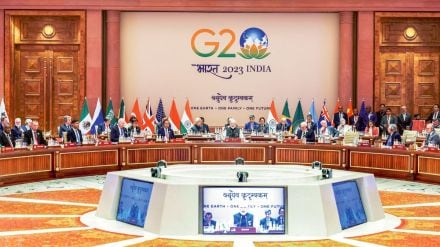By Ashok Gulati & Shyma Jose
PM Narendra Modi and his G20 team of deserve compliments for the success of India’s presidency. In particular, external affairs minister S Jaishankar and India’s Sherpa, Amitabh Kant, should be applauded for their months of hard work .
India’s G20 presidency will be remembered as a catalyst in integrating the aspirations of the Global South, particularly Africa, into the mainstream. India’s masterstroke with inclusion of the African Union in G20, acknowledges the significance and potential of Africa as a vital partner in global development and stability. The new G21 will now comprise of 84% of the world’s population, up from about 66% earlier. India and Africa, constituting 36% of the global population, unfortunately are home to nearly 69.4% (503 million) of the world’s undernourished people in 2020-22 (FAO et al. 2023 & WPP, 2022). These two regions together accounted for 67% and 75.8% of world’s stunted and wasted children under five years, respectively, in 2022 (see graphic).
How can the Global South steer the world towards food and nutritional security in the face of climate change?
First, keeping international borders open for agricultural trade is the need of the hour for ensuring food security of the Global South. In this context, it is worth noting that in the last three years, India exported 85 million tonnes of cereals to the world, contributing to global food security. Against this backdrop, India’s recent restrictions on exports of rice and wheat will not go very well with G 21 as it hurts African countries the most.
Second, developed countries must commit to providing $100 billion for the loss and damage caused by climate change. This will pave the way for large-scale climate mitigation and adaptation efforts in developing economies. Subsequently, the World Bank could play catalytic role in mobilising funds even from the private sector to address global challenges of poverty reduction, ensuring food and nutritional security, and combating climate change through adaptation and mitigation policies. The G 20 estimates that additional investment of $3 trillion will be required annually through 2030 to address these issues, including debt relief for low-income countries. World Bank president Ajay Banga emphasised that, in addition to contributions from developed nations, private capital investments are essential to complement the current sources of financing. That is, if every dollar raised from developed nations is matched with a dollar from hybrid capital, it could unlock more than $6-7 billion in lending for poorer nation to fight climate change over the course of a decade.
Third, with Africa’s inclusion in G 20, the challenges posed by rapid population growth, persistent poverty, and widespread undernourishment become more serious. Initiating a comparative analysis between India and Africa could foster south-south learning and collaboration in for sustainable agriculture and food systems. Further, high prevalence of nutritional insecurity in the two regions calls for leveraging agriculture policies to be more nutrition-sensitive. Scaling up bio-fortification in staple crops can ensure availability of nutritious diets in areas affected by chronic malnutrition in India and Africa. The Harvest-Plus programme of the Consultative Group on International Agricultural Research (CGIAR) as well as Indian Council for Agriculture Research (ICAR) have been successfully developing new varieties of nutrient-rich staple food crops such as iron and zinc bio-fortified pearl millet, zinc bio-fortified rice and wheat, iron bio-fortified beans, etc. Such innovations can be implemented on a large-scale in Indian states and African countries if Sustainable Development Goals (SDGs) of eliminating hunger and malnutrition have to be achieved by 2030.
Fourth, access to nutritious food alone cannot address the multi-dimensional problem of undernutrition in these regions. They require targeted and multi-pronged strategies to accelerate nutritional security. Our empirical analysis at ICRIER using the latest unit-level data of NFHS (2019-21) (with a sample of 205,641 children under five), highlights that mothers with education, particularly higher education, and mothers with normal BMI index have strong association with undernutrition among children. Between 2005-06 to 2019-21, India has made considerable change in bringing down underweight women (with BMI index <18.5 kg/m2) from 35.5% to 18.7% whereas women with higher education level increased from 12.0% to 25.9%. Educated women are more informed about nutrition and healthcare, tend to delay marriage, have fewer children and healthier babies.
Therefore, the state governments need to promote schooling and higher education through liberal scholarship for girls. Let’s say, start the scholarship with Rs 500 per month from 9th standard, increasing it gradually to Rs 1,000 per month till end of graduation and post-graduation. It can dramatically reduce the dropout rates among female in secondary and higher education. Investment in women’s higher education is necessary to transform them into valuable assets, making significant contributions to the female labour force participation and fostering long-term economic growth. These findings need to be shared with African nations for cross learning in Global South collaboration.
Fifth, our analysis found investments in WASH initiatives could bring about multiplier effect on nutritional outcomes. India, under the Swachh Bharat Abhiyan launched in 2014, significantly increased the coverage of households with sanitation facilities from 48.5% to 70% between 2015-16 and 2019-21. The Abhiyan which targeted eliminating open defecation and eradicating manual scavenging has multiplier effects. This could be another learning for Africa to tackle high levels of malnutrition.
Inclusion of the African Union in G20 (now G21) is the hallmark of India’s G20 presidency. But it will have meaning only if India and Africa can collaborate effectively to deal with their food and nutrition security in the face of climate change. It is challenging, but is achievable with science and open trade policies.
Ashok Gulati & Shyma Jose, respectively, distinguished professor, and research fellow, ICRIER. Views are personal.
